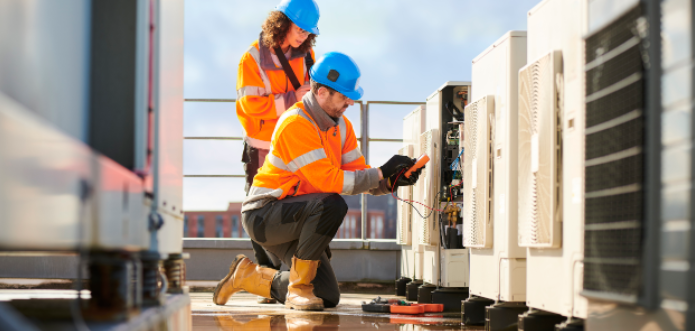
During hurricane season, Ocala homeowners face increased risks of electrical hazards due to intense storms, flooding, and power outages. Statistics reveal that electrical-related incidents often rise during hurricane season as high winds and flooding damage power lines and home wiring systems. In Ocala, residents must contend with common electrical risks like downed power lines, water exposure to electrical outlets, and surge damage. Being aware of these dangers is the first step toward effective preparation and protection.
Preparing Your Home’s Electrical System for Hurricane Season
To safeguard your home against electrical hazards, start by inspecting and upgrading your electrical system. Engage a licensed electrician to ensure wiring, outlets, and circuit breakers are up to code. Installing essential equipment such as whole-home surge protectors and backup generators can provide added security. Surge protection shields your electronics and appliances from sudden spikes, while a generator offers backup power during outages. Prioritize hurricane preparedness by scheduling a pre-season electrical system inspection to address potential vulnerabilities.
Best Practices for Electrical Safety During a Hurricane
When a hurricane approaches, implement crucial storm safety tips to reduce risks. Begin by unplugging major appliances to prevent damage from power surges, which often occur before or after a storm. For those using generators, adhere to generator safety guidelines: operate generators outdoors to avoid carbon monoxide buildup, use proper extension cords, and never plug a generator directly into a wall outlet. Keep in mind that avoiding water exposure is essential, as even a small amount of moisture can cause significant electrical hazards. By following these practices, you can help protect your family and your property.
What to Do After the Hurricane: Electrical Safety Checklist
After a hurricane, it’s vital to inspect your home for any electrical hazards. Use this post-storm safety checklist to guide you:
- Check for downed power lines around your property and report any issues.
- Avoid stepping into floodwaters that may be in contact with electrical outlets.
- Inspect your breaker box for any unusual odors, sounds, or visible damage.
- Examine appliances and cords for signs of water damage or scorch marks.
This electrical inspection checklist will help you identify issues before they escalate. Refrain from turning on power or plugging in appliances until you’re certain it’s safe to do so.
When to Call a Professional Electrician in Ocala
Sometimes, the safest choice is to bring in a licensed electrician. If your home’s electrical system shows signs of damage, or if any appliances have come into contact with water, professional safety checks are crucial. Certified electricians offer reliable electrical repair services, ensuring that your home meets safety standards post-storm. Never attempt DIY repairs with electrical wiring or equipment after a hurricane; this can be dangerous and lead to long-term hazards.
Conclusion: Staying Safe and Prepared During Hurricane Season in Ocala
In Ocala, proactive preparation is key to navigating hurricane season safely. By understanding potential risks, preparing your electrical system, and following best practices during and after storms, you can protect your home and family from electrical hazards. Take the time to inspect, prepare, and, when needed, call in a professional. Being prepared ensures that you’ll weather hurricane season with confidence, knowing your electrical system is safe and secure.


 Ensuring the Safety of Your Wisconsin Home’s Roof: When to Consult a Roofing Expert
Ensuring the Safety of Your Wisconsin Home’s Roof: When to Consult a Roofing Expert  Enhance Your Comfort with Premier Gas Water Heater Installations in Red Wing, Minnesota
Enhance Your Comfort with Premier Gas Water Heater Installations in Red Wing, Minnesota  Creating Inviting Outdoor Spaces: The Benefits of Outdoor Fireplaces in the Twin Cities
Creating Inviting Outdoor Spaces: The Benefits of Outdoor Fireplaces in the Twin Cities  Why Are Real Estate Serviced Apartments An Ideal Investment?
Why Are Real Estate Serviced Apartments An Ideal Investment?  How a Solar Company Designs Custom Solutions for Your Home
How a Solar Company Designs Custom Solutions for Your Home  Creative Uses of LED Strip Lighting for Accent Lighting
Creative Uses of LED Strip Lighting for Accent Lighting  The Benefits of a Fire Pit for Year-Round Outdoor Living
The Benefits of a Fire Pit for Year-Round Outdoor Living  The Role of Minimalist Lighting in Modern Interior Design: Trends and Functional Analysis
The Role of Minimalist Lighting in Modern Interior Design: Trends and Functional Analysis  Top Security Features to Look for in a Garage Door
Top Security Features to Look for in a Garage Door  Comprehensive Guide to Mold Removal in Hunterdon County: Safeguarding Your Home and Health
Comprehensive Guide to Mold Removal in Hunterdon County: Safeguarding Your Home and Health